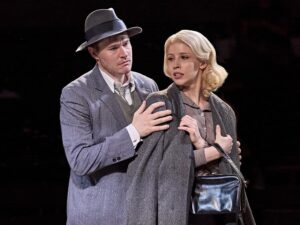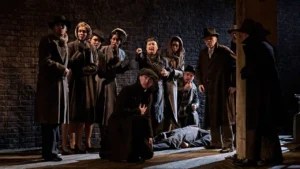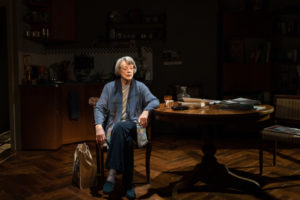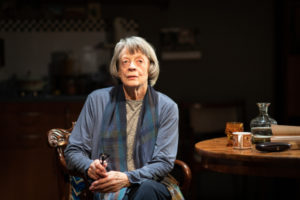A musical thriller from a stellar team
★★★★

Theatre has become something of a vampire in recent years, roaming the dark auditoria of cinemas searching for films to turn into musicals. Sunset Boulevard is being revived; Groundhog Day is at the Old Vic; a version of Brokeback Mountain with music can be seen at Sohoplace; 42nd Street, The Wizard Of Oz, Sunset Boulevard and Grease are all back this year; Mrs Doubtfire is on the way and of course Back To The Future, Moulin Rouge and The Lion King are already racking up long runs. Even so, one film I never expected to be adapted as a stage musical is The Third Man. Yet here it is at London’s Menier Chocolate Factory – and it’s a triumph.
I have a slight reservation about one aspect of the adaptation of The Third Man, which I’ll come to, but it’s far outweighed by the thrilling pace and the rollercoaster emotions it evokes. Wisely it sticks closely to Graham Greene’s original mystery story of love and betrayal with its reluctant hero, its twists and turns, and its shocks. I’ll try not to give too much away because you may not have seen Carol Reed‘s classic black-and-white film from 1949.
The creative team of Christopher Hampton, Don Black, George Fenton and Trevor Nunn are all as old or older than the film. Their new musical version is a distillation of all their talent and experience.
Let’s start with the music written by George Fenton. Among the hundred plus films and TV series for which he has written the score are Gandhi, You’ve Got Mail, The Jewel In The Crown and David Attenborough’s Planet series. Appropriate to a serious story, it leans towards the drama of Claude-Michel Schoenberg‘s music for Les Miserables or the starkness of Kurt Weill’s The Threepenny Opera.
Mr Fenton is a brave man to tackle The Third Man because the film’s theme is one of the most famous ever written. In this musical version, he pays brief homage to the jangling zither-based hit but goes for a score that suggests danger, passion and anger. Played by a live nine piece orchestra, directed by Tamara Saringer, the songs enhance the story and reveal character, as they should in a good musical.
The legendary Don Black and Christopher Hampton, provide the tight book and sharp lyrics. There are even a couple of duets that Rodgers and Hammerstein would have been proud of.
The story is about a pulp fiction writer called Holly Martins, who arrives in Vienna at the end of World War 2, when it is occupied by the American, British and Russian soldiers. He’s there to do some work for an old school friend Harry Lime, only to find he has died in an accident. As the first act progresses, he becomes increasingly suspicious about the circumstances surrounding his death. The British military police meanwhile indicate to him that Lime was a bad lot.
The first act ends with an astonishing discovery and the show continues with even more shocking revelations and heightened drama.
Where the musical really stands out is in the feelings expressed by Holly and also by Lime’s lover Anna. Both loved Harry and can’t believe he would have been involved in anything truly bad. As the pair investigate Harry’s death, Holly falls in love with Anna and pursues her with reckless, puppy-like devotion, a sentiment she does not return.
Sam Underwood is a fine singer and actor who communicates sadness, frustration and infatuation as he searches for the truth and wrestles with his conscience. With his naïve, boyish determination, Holly could be a hero from one of his adventure novels
Natalie Dunne is strong as Anna. By dwelling on her character more than is the case in the film, the musical is able to show her in a nightclub singing songs that could have come out of The Threepenny Opera or indeed Cabaret, songs both sad and amusing- and indicative of her free-thinking character. And because we get to know her, the subplot of the triangle between Holly, Anna and Harry carries more weight.
Simon Bailey also impresses as a callous villain who commands devotion. And that’s my reservation about the adaptation: he is portrayed as more obviously nasty and not as full of fake charm as this key character was in the film.

Edward Baker-Duly and Jonathan Andrew Hume strike just the right note as righteous but ruthless military policemen Major Calloway and Sergeant Paine. Other characters are more in the way of caricatures but they are well acted- it’s a pleasure to see Derek Griffiths as The Porter. Rachel Izen is his wife, and Gary Milner, Alan Vicary, and Harry Morrison are Lime’s shady associates.
The design by Paul Farnsworth is full of atmosphere. The costumes in grey or other subdued colours add to the film noir effect. Rubble litters the edges of the stage floor, a dark alley or tunnel goes off to the side: You feel you are in a sinister city ravaged by war.
The Menier has been reconfigured so the audience is on three sides. Actors run up and down aisles, ramping up the excitement, and, thank goodness, the sight lines are kept free from obstruction. The simplest of furniture is enough to suggest effectively a hotel lounge, backstage at the nightclub, a flat, and even a ferris wheel gondola.
Getting us off to the best of starts is the opening scene where Holly wanders the dimly lit streets of Vienna at night, helped by dark expressionist lighting from Emma Chapman, and is surrounded by people begging. Straightaway we know we are in desperate times.
It’s a masterpiece of direction by Trevor Nunn, who brings so much that he has learned and practised in a long career that encompasses Les Miserables, Cats and the National Theatre production of Oklahoma! He constantly holds our attention, with a changing pace that switches from frenetic activity to tense conversation.
I must credit to Christopher Hampton whose previous plays and translations include Les Liaisons Dangereuses, Art, Sunset Boulevard and Florian Zeller’s The Father. I thought a musical adaptation of The Third Man couldn’t be done, but he and his team have done it.
The Third Man is performing at The Menier Chocolate Factory until 9 September 2023.
Paul paid for his ticket to see the final preview performance.
Watch this review of The Third Man at The Menier on YouTube



